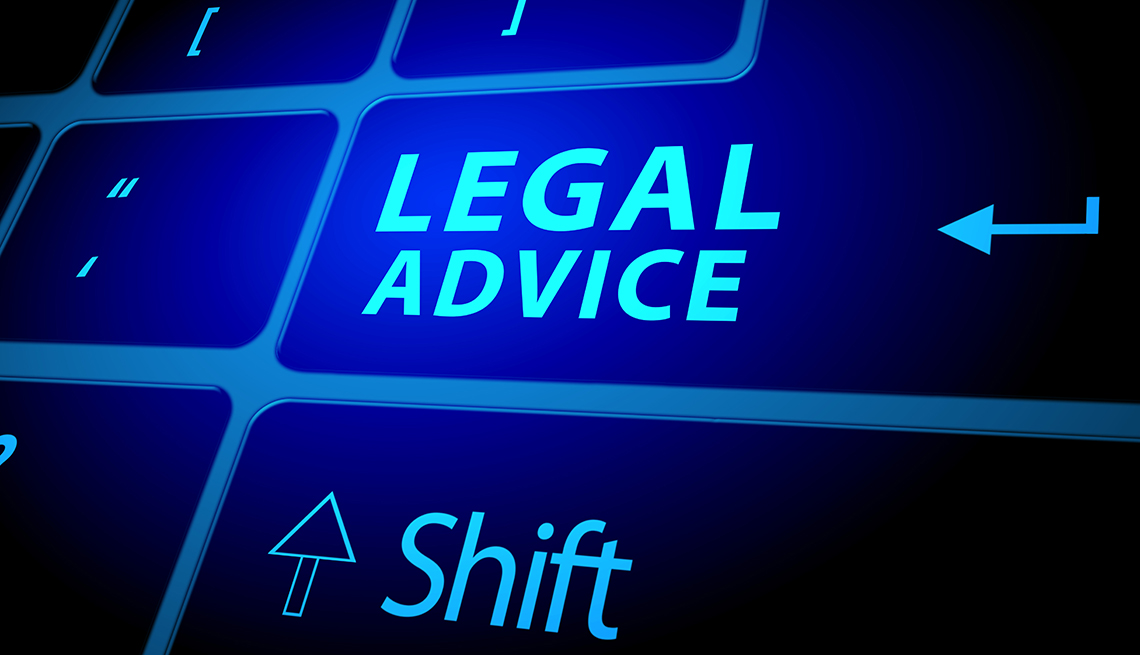Estate Planning in the Time of the Coronavirus Pandemic
Social distancing makes witnessing a will difficult but not impossible
En español | In the past few weeks, an escalating number of clients have hurried to meet by videoconference and phone with Daniel S. Rubin, a partner at the New York City law firm of Moses & Singer, who is working from home.
"Mortality is on the front of their minds,” Rubin said. “Spurred by the coronavirus pandemic, clients who I haven't heard from in 10 or 15 years, as well as prospective new clients, have been reaching out to update their existing estate planning documents, or write new ones. It's been pretty unusual to get this many requests. And they want to move quickly.”
Little wonder that fear of COVID-19, the disease caused by the novel coronavirus, has scores of people writing wills and making critical estate planning decisions about who will be in charge of their medical care and finances if they're ill and incapacitated.
Some 52 percent of people age 55-plus don't have a will or the other key estate planning documents that you might need during the pandemic, according to Caring.com.
Making a will — virtually
But here's the hitch. With most states imposing stay-at-home orders and strict social distancing mandates, the mechanics of executing these legally binding documents is requiring some virtual soft-shoe.
That's because in most states these important documents require adult (18 or older) witnesses and notarization, a procedure that generally takes place in person and with signatures in front of a notary to be valid.
Some states require witnesses who are “disinterested parties,” meaning they aren't in line to inherit anything. Not easy to do when you're probably hunkered down at home with members of your family to prevent the spread of the virus.
In Virginia, for example, the signing of a will must generally be witnessed by two competent persons, who also must sign the will in front of the testator, or person leaving the will. Although the Virginia law does not require a will to be notarized, attorneys usually recommend it.
Prior to the COVID-19 pandemic, 23 states already allowed remote online notarization in which a notary and signer are in different locations and use two-way audiovisual communication to securely execute electronic documents. These include Florida, Kentucky, Michigan, Minnesota, Montana, Nevada, Ohio, Tennessee, Texas, Utah, Virginia, Washington and Wisconsin.
Given the pressure by residents anxious to prepare these estate planning documents, some states are now permitting remote online notarization for some of these documents, including Arizona, Iowa and Pennsylvania.
Others have made their laws more flexible during the pandemic. On April 7, for instance, New York Gov. Andrew Cuomo issued an executive order permitting remote witnessing of wills, powers of attorney, health care proxies, deeds and other documents. He had previously issued an order permitting video notarization, allowing New York residents who wish to execute new or updated wills, health care proxies or powers of attorney to do so without leaving home or admitting others to their home, provided they follow specific conditions, such as requiring that the videoconference be a direct communication between the person signing, the witnesses and the supervising attorney.
A nationwide solution could come in a bill introduced March 19 by Sens. Mark Warner (D-Va.) and Kevin Cramer (R-N.D.) that would allow remote online notarizations in any state, so people could conduct legal actions without compromising their social distancing practices. “Virginia has safely and securely allowed the use of remote notarizations for years,” Warner said in a press release. “At a time when most people should be staying at home, there's no reason anyone should have to leave just to get notary services."
The virtual estate consultation
Today, estate lawyers like Rubin are connecting with clients via videoconference services like Zoom or Skype. The basic estate documents clients typically want to review: a will to legally name who should inherit their property; a durable financial power of attorney that assigns another person to make financial decisions for them if they're incapacitated; a health care power of attorney, along with a living will, to allow a specified individual to make health care decisions for them if they can't do so for themselves; and the HIPAA authorization form to consent for someone else to access medical information from a health care provider.
"My assistant and paralegal are on my Zoom meetings with a client, and, when we're ready to sign documents, my assistant and I will witness, and my paralegal will act as a notary,” Rubin said. “That said, lawyers, by nature, are conservative. My recommendation, so the documents aren't challenged in court, is going to be once everything stabilizes, and we are back to something of normalcy, come into the office and let's spend 15 minutes together. We'll perform the normal execution ceremony that we would have performed if we could have been together."
Save 25% when you join AARP and enroll in Automatic Renewal for first year. Get instant access to discounts, programs, services, and the information you need to benefit every area of your life.
5 key estate planning documents
These are the five essential estate planning documents to have in place during the pandemic. To get details on where your state stands on requirements for witnesses and how to use online notarization, consult an estate planning lawyer, or contact your secretary of state's office, which is in charge of regulating notaries in most states. Another online resource for estate planning laws is Nolo, a legal publisher, which provides a state-by-state guide.
- Will: This is a legal document that directs the distribution of your assets after death and can appoint guardians for minor children. If you die without a will, your state's laws decide who gets your assets and other property. Many states require two witnesses to watch you sign and date the will and then sign as witnesses. Usually one of the witnesses can be the lawyer who drafted the will. Most states do not allow beneficiaries under the will to be witnesses.
- Health care durable power of attorney: A durable power of attorney for health care, or health care proxy, is a good supplement to a living will (see below). It permits you to name someone to make health care decisions for you if you are incapacitated in some way (say, in a coma) but still alive. There is no reason you can't have both a living will and a durable power of attorney, and, in fact, you probably should have both. In some states you'll automatically get both, because the two are merged into a document called an advance directive. Typically, you would ask a friend or close relative to take on this responsibility. But be sure that you have discussed it with them and that they have agreed to do so ahead of time. Make sure people you pick as your proxies have a copy. In most states, the document must be signed, dated and notarized. Having it signed by an adult witness isn't usually required, but is recommended.
- Living will: A living will, sometimes called an advance care directive, is a sort of hybrid will that outlines the kind of medical care you want if you are terminally ill. For example, if you don't want to be kept alive on life-support systems, such as a respirator or feeding tube, you can make that known. (As morbid as it may seem, this could save your family a substantial sum in medical bills.) You can include instructions for organ donation. For a living will to be valid, it typically must be witnessed by two adults, and they usually can't be members of your family or your attending physicians. Depending on your state, you'll need to sign the document in front of witnesses, a notary or both.
- Durable power of attorney for finances: A financial power of attorney is a document that gives someone the authority to handle financial transactions on your behalf. It's designed to let someone else manage all of your financial affairs for you if you become incapacitated. In some states you simply sign the document in front of a notary; others require witnesses to sign as well.
- HIPAA authorization: The federal Health Insurance Affordability and Accountability Act set privacy rules for patient records; a release document for records is generally executed along with estate planning documents. It allows you to name people to be treated with the same rights you have regarding disclosure of medical records. Typically, this includes your spouse, children or other close relatives, so that these family members can communicate with doctors and nurses and find out how you're doing if you're hospitalized.
Hire a lawyer, or do it yourself?
The cost to get your estate planning documents can vary widely depending on where you live and how complex your situation. A lawyer might charge a flat fee of anywhere from $300 to more than $1,500 to draft a will and other basic estate planning documents. If working on an hourly basis, estate lawyers typically charge $150 to $300 an hour.
Demand for more affordable, simple do-it-yourself wills and estate planning documents is also on the rise. For some time now, you've been able to draft an online will on a home computer via firms like Rocket Lawyer, LegalZoom, FreeWill, QuickenWillmaker & Trust 2020, and Trust & Will. Note that each state has its own rules and documents.
"Business for us has doubled in the last month and a half,” said Cody Barbo, founder of the digital platform Trust & Will. The firm has created a resource guide to provide information about setting up an estate plan, updating documents online, and how to make your documents valid during the COVID-19 stay-at-home orders. It has also partnered with AARP to provide resources for the community.
On the Trust & Will digital platform, it's free to create an account and preview your documents. There's a one-time fee to purchase them: A will, for example, costs $69 for a single person, $129 for both spouses of a married couple. Most people using this service complete their will (or trust) in under 30 minutes, according to Barbo.
"For us, power of attorney and health care directives are big right now,” Barbo said. “People want to make decisions around who can access their medical and financial records, and who can make decisions on their behalf if something were to happen to them, including DNR — do not resuscitate — and final wishes — burial and cremation.”
After the forms are filled out online, they're downloaded, printed and signed, or the firm mails the printed documents to the clients to sign. “Many of the people who are tapping our online estate planning documents are staying safe at home and social distancing, so they're at least signing their documents and then waiting for lockdown restrictions to lift before having them notarized,” Barbo said.
"Others are going to banks and UPS stores that are still open and offering notary services. In two states — Nevada and Indiana — after a person drafts a will online with Trusts & Will, he or she connects with Notarize.com by video chat with a notary who has received the emailed will. The notary then examines the document, asks some questions, notarizes it and emails it back. The whole procedure is recorded, encrypted and stored by Trust & Will."
Rubin, the estate lawyer in New York, stressed that the online companies are no replacement for services like his. “What those virtual do-it-yourself programs spit out is technically correct,” he said. “The problem is you don't get the tailored advice you would get from a lawyer.”




